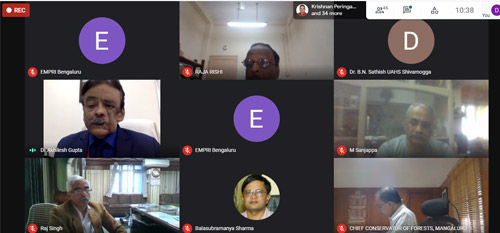 Experts discussed the impact of climate on biodiversity in India like adaptations, migration in species, development of physiological traits, changes in vegetation, and probable solutions for these pressing issues at the International Virtual Conference on Biodiversity and Ecosystem Services in a Climate Change Perspective.
Experts discussed the impact of climate on biodiversity in India like adaptations, migration in species, development of physiological traits, changes in vegetation, and probable solutions for these pressing issues at the International Virtual Conference on Biodiversity and Ecosystem Services in a Climate Change Perspective.
“There are clear evidences now that climate change has a direct bearing on biodiversity. This change is forcing species to adapt either through migrating, changing phenological cycles, or developing new physiological traits” said the Chief Guest of the Conference, Dr. Akhilesh Gupta Advisor & Head, SPLICE, Department of Science & Technology (DST, Govt. of India at the conference organised on 10th & 11th of December 2020 by the Environmental Management & Policy Research Institute (EMPRI) Bengaluru with support from DST.
Quoting the Report of the Millennium Ecosystem Assessment, he said that Climate change is likely to be the most substantial drivers of biodiversity loss by the end of this century and stressed on understanding of the link between biodiversity and climate change, impact of the projected temperature change, especially on fragile biodiversity hotspots like the Himalaya.
DST’s studies as part of the National Mission for Sustaining the Himalayan Ecosystem (NMSHE) show that some of the wildlife ecosystems are getting adversely impacted, and the temperature increase in the Himalayan region is nearly double of the changes taking place over the plains.
Lauding India’s efforts in climate mitigation, Dr. Akhilesh Gupta said, “According to UN Climate Change tracker India’s performance in last 5-6 years has been very good. We are well under the 2-degree centigrade target for the century. We targeted to achieve 20 Gigawatt of solar power by 2022 and achieved this by 2018 and now targetiing100 Gigawatt by 2022.”
Dr. Akhilesh Gupta urged all the researchers and delegates to look for solutions and recommendations for the pressing issues of Climate Change on Biodiversity in the two-day conference, which the government can work upon.
 “India is a subcontinent that includes virtually all the major climate zones of the world. Thus the continuous observation of the effects of Climate change on different vegetation types will therefore be of great interest to the international scientific community,” Prof. Klaus von Gadow from Georg-August University, Germany said.
“India is a subcontinent that includes virtually all the major climate zones of the world. Thus the continuous observation of the effects of Climate change on different vegetation types will therefore be of great interest to the international scientific community,” Prof. Klaus von Gadow from Georg-August University, Germany said.
“India has done extremely well in wildlife conservation. The only way we can continue doing so is to rope in people as partners and incentivise them to maintain biodiversity and wildlife along with the land use patterns to achieve a broader goal of climate change adaptation,” Prof. R. Sukumar Centre for Ecological Sciences. IISc, Bengaluru pointed out.
The books ‘Building Climate Resilience ‘ and ‘Karnataka Butterflies: A field guide’ were released by Shri. Raj Kishore Singh, IFS., Principal Chief Conservator of Forest, Development & Director General, Environmental Management & Policy Research Institute (EMPRI). “The rate of degradation of forest and our afforestation efforts has almost coincided, and it is necessary to find the gap between the efforts in restoring ecosystem service and its outcome,” he said.
The inaugural session was followed by an online oral and poster presentation by faculty, students, civil society organizations, researchers, and officials from India and abroad in the technical sessions.






























